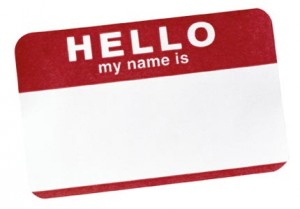 Your name lays the foundations of your brand. Once launched, your name will greatly determine your position in the fight for consumers. You must put a lot of time and effort into finding the perfect name for your brand. This is a prospective customer’s first impression of you, so choose wisely. Here are a few things to consider:
Your name lays the foundations of your brand. Once launched, your name will greatly determine your position in the fight for consumers. You must put a lot of time and effort into finding the perfect name for your brand. This is a prospective customer’s first impression of you, so choose wisely. Here are a few things to consider:
Why finding your name is so important
A successful name can increase your company’s brand longevity. It can invite customer interest and further investigation into what exactly your business is and what products and services it provides. It can differentiate your business against your competitors and make you stand out among the ever-growing crowd. If chosen well, it can tell people who you are, what you do, and how you do it.
What’s most important in a startup name?
A good name has to be able to communicate on its own without a great deal of advertising. Let your name be informative without being hokey. If your name alone can advertise for the business, you can save money on advertising!
Your name also has to be easy to pronounce and have neutral-to-positive associations around the world. Unusual, catchy names definitely intrigue people. If I had to make a decision between the above two options, I’d say that a brand name needs to be catchy. However, if you can merge the above two options in any way, you’ll have a winner of a name. Short and concise brand names tend to work best. Try not to make it too much of a mouthful for consumers to remember.
Which elements make a name memorable?
This can be a bit tricky, and you must walk a fine line.
– Rhyming: Names that rhyme often stick in people’s heads. How could anyone forget the Piggly Wiggly chain?
– Imagery: Think in pictures, as well as words, when branding. For example, “Jaguar” works well as a brand.
– Alliteration: To create alliteration, begin each word in the name with the same letter or sound. Successful examples include Coca-Cola and Krispy Kreme.
– Haplology: To create a haplology, simply take a three-word phrase and abbreviate the word in the middle. A great example is Toys “R” Us.
– Neologisms: A neologism is a newly invented word, like Google or Wii. Neologisms can be created by respelling an existing word. Google is a respelling of the mathematics term googol.
– Combinations: You can also make a neologism by combining two words. Snapple is a combination of “snap” and “apple.”
An example of a bad memorable name can be found in the cleaning product “Ciff,” which was linked to the name of an STD, syphilis (not great in anyone’s book).
How should long-term marketing be considered when developing a name?
A good brand name will, over time, achieve:
– Clear message delivery,
– Credibility confirmation,
– Emotional connections for prospective clients,
– Buyer motivation, and
– User loyalty.
To succeed in branding, you must understand the needs and wants of your customers and prospects. You do this by integrating your brand strategies throughout your company at every point of public contact.
Your brand resides within the hearts and minds of customers, clients, and prospects. It is the sum total of their experiences and perceptions, some of which you can influence, and some which you cannot. These all start with, and will continually be influenced by, your brand name. Take your time and use this information to find your perfect brand name. Then, get it out there. Bring in your first-time customers, and use your brand-name recognition to keep them coming back.
Louis Rix is the Director and co-founder of Carfinance247.co.uk the UK’s leading car finance broker.




